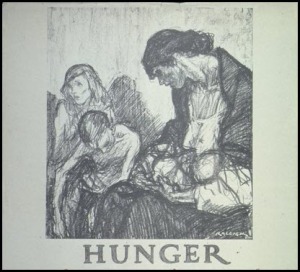 Front page headline in USAToday on Monday, Aug. 8, 2011: "How bad will it get?"
Front page headline in USAToday on Monday, Aug. 8, 2011: "How bad will it get?"
What exactly was the "bad" under discussion? Was it the 29,000 children who have already died in Africa (U.S. Gov. statistic, released Aug. 4, 2011) because of the current drought? Was it about the women who carry dying children, sometimes for weeks, in the feeble hope that the in camps they will find help? Was it the children who die daily because of lack of clean water? Was it the thousands of women who live in unimaginable horror because of sex slavery?
The subhead in USAToday clarified the headline: "As the USA's lowered credit rating takes the air out of the stock market, bad economic news ripples around the globe."
Another headline in USAToday, from the Associated Press on Tuesday, Aug. 9, 2011. This headline was on page 5A, lower left corner (for whatever it is worth, the page placement that gets the lowest readership of any area on the page). This headline said: "Famine threatens Somali children"
Threatens? Threatens? 29,000 already dead and the headline mitigates the horror by using the totally misleading verb "threatens."
Words in headlines and subheads matter
Statistically, headlines and subheads will get 80-plus percentage readership of anyone who picks up a publication.
What if the front page headline said:
29,000 children already dead, more dying daily
. . . . .Losses in the stock market pale in comparison to loss of human life
What if the article then detailed the ways and organizations that could help? What if they featured stories about miracles like Plumpy Nut™, an incredible nutritional packet, of fairly recent development, that can literally bring a child back from starvation in a matter of days, that tastes yummy like sweet peanut butter, and is easily shipped and kept because it needs no refrigeration? Or how organizations use them, but how much more is needed? (read that story HERE)
Writers and editors headline what is important to them and often what they assume is important to their audience.
May the Lord have mercy on us.
Application for Christian communicators
For whatever is in your heart determines what you say. Matt. 12:34 NLT
For by your words you will be acquitted, and by your words you will be condemned. Matt. 12:36-38
First we need to check our hearts to make certain that our values measure up with those of our Lord. Then we need to communicate clearly and in practical ways about how to put our faith into action.
If you are short on ideas on how to communicate compassion and practical actions, Effective Church Communications is sponsoring a collection of communications and will host free downloads of samples: CLICK HERE for more information on this FREE program.


Please share your thoughts, comments, questions!